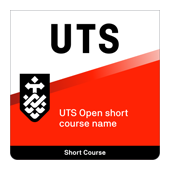Key benefits of this course
Upon successful completion of this course, participants should have gained an understanding of data and how to utilise it in effective ways through SQL, Excel and Power BI, to create reports used by business to display key data and metrics.
Participants should specifically be able to:
- Analyse databases and extract key data
- Present data in a structured way
- Apply advanced Excel techniques
- Build reports and data visualisations in Power BI.
Digital badge and certificate

A digital badge and certificate will be awarded following the successful completion of any necessary tasks or assessments to demonstrate acquired learning of the short course or for meeting attendance and/or participation requirements.
Learn more about UTS Open digital badges.
Course outline
This course comprises three modules. Each module will be run as a one-day, small-group virtual workshop, focusing on one specific tool in the data analyst toolkit.
Day 1 - SQL
- SQL for data and business analysis
- SQL basics and functions
- Storing and grouping.
Day 2 – Excel, macros and visual basics
- Excel formulas
- Macros and reporting
- Visual basics.
Day 3 - Power BI
- Connect to data with Power BI
- Data manipulation and visualisations
- Data analysis expressions (DAX).
Requirements
To participate in this online course, you will need a personal computer with adequate internet access, web conferencing capability and an operating system with a web browser compatible with Canvas, Zoom and Microsoft Teams.
Enrolment conditions
Course purchase is subject to UTS Open Terms and Conditions.
COVID-19 response
UTS complies with latest Government health advice. Delivery of all courses complies with the UTS response to COVID-19.
Contact us
For any questions on enrolment or payment, please email support@open.uts.edu.au
If you have a specific question on course content or requirements, please email FEITshortcourses@uts.edu.au








![ITIC logo[1].png](/globalassets/logos/itic-logo1.png)









